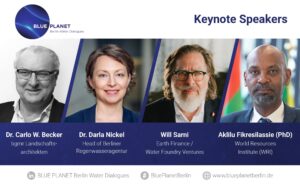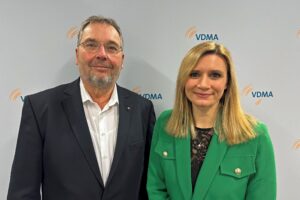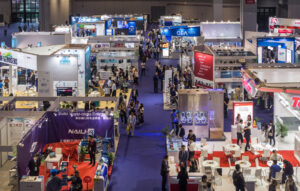ACHEMA 2000 – Bigger and more international than ever – Buzzing atmosphere – High attendance
On Monday, ACHEMA 2000, the international Exhibition Congress for chemical engineering, environmental protection, and biotechnology, opened with strong attendance and an optimistic atmosphere among attendees and exhibitors. 4,148 exhibitors from 48 countries are presenting the latest developments in plant and equipment, technology and know-how for the chemical and other process industry sectors. The 145,572 m2 net exhibition space is divided among 9 halls and an open air area. There are twelve thematic exhibition groups and special show on biotechnology. Since the last event in 1997, the number of exhibitors has increased by 12.2 % and the net exhibi-tion area has grown by 3.5 %, beating all previous records.
Already during the first two days, the optimism of exhibitors and attendees was clearly evident. The quality of the attendees is excellent. Many delegations including ones from China, Japan and India are visiting this ACHEMA. High ranking representatives from many countries including Saudi Arabia, Australia and South Africa are come with the objective of making new contacts and learning from the ACHEMA know-how for their developing regions. In all, 230,000 visitors from more than 100 countries are expected.
ACHEMA 2000 - Trend-setter and innovation exchange
At the opening on Sunday, German research minister Edelgard Bulmahn emphasized ACHEMA's role as a first class trend-setter for international and national innovations. New areas of industry will be opened through the development of new methods and processes in the pharmaceutical and chemical industry. The 21st century will be dominated by Life Sciences - biology and its applications. Bulmahn noted that already the research and development in this field has spurred a boom for the sector. 165, mostly young and research intensive, companies are participating in the newly formed exhibit group Biotechnology and about 1,189 equipment suppliers emphasize the growing importance for this growing sector.
Prof. Utz-Hellmuth Felcht, Chairman of DECHEMA, the society that organises ACHEMA, stressed that the economic climate also gave cause for optimism. "The chemicals industry is regaining ground on the international markets, in Europe, in the USA, and in the newly industrialised countries of Asia and Latin America."
The investment goods sector and plant builders are also profiting from this development. Against this background, it is no surprise that ACHEMA has become even more international, said Felcht. In comparison to ACHEMA 97, the proportion of foreign exhibitors has risen from 33.6 to 38.5%. "However, the encouraging economic climate is not in fact the main secret behind ACHEMA's success," continued Felcht. "More important than the quantitative indicators is the quality of the equipment and processes, the extent of the technical and scientific progress and thus the enormous capacity for innovation demonstrated here by the exhibitors in a form unparalleled anywhere in the world. Over the last century, the chemicals industry has become one of the key industries in every modern industrial society, although sadly this is not always apparent to the man in the street."
The Research and Innovation exhibition group in particular, in which 251 exhibitors from universities, institutes and research-intensive companies show off the fruits of their labour, also makes ACHEMA an extraordinarily efficient forum for technology transfer.
The ACHEMA conference programme was also very well received during the first two days. The Congress Centre did not have enough room to accommodate all the visitors wishing to attend the 1st International Symposium on "Synthesis, Screening and Sequencing", which was supported by a special show put on by the exhibitors in this field. The symposium provided a stage for innovative companies to present their latest developments and research results, which will trigger new, efficient developments not just for genome research or the manufacture of new active ingredients or catalysts, but for many areas of the process industry.
Many of these trends, which are currently still at the laboratory stage at a rapid rate, will determine the production of tomorrow. Prof. Klaus-Peter Jäckel of BASF outlined the revolutionary development of microtechnology - "from vision to reality" - in his plenary lecture. It will not necessarily be possible to replace the chemicals factories, but this work will enable us to understand processes better and implement them more efficiently, more safely and using fewer resources in the future.
New developments and trends
The exhibitors in all exhibition groups are presenting numerous world firsts as well as further developments. The following trends are emerging:
- Hardly a single product segment without IT integration: even previously "unintelligent" components such as pumps or valves are increasingly fitted with IT components
- Biotechnology is increasingly penetrating all areas of the process industry
- New methods that have been optimised in terms of efficiency and product selectivity are squeezing out established processes
- Microreaction technology is coming
- In catalyst research, methods of combinatorial synthesis are arriving on the scene
- Pipe of the end environmental protection is being nudged into the background by production-integrated environmental protection. This is also reflected in the number of exhibitors at ACHEMA 2000 offering environment-friendly system solutions, which has increased by over 50% to more than 1500 exhibitors.
- Whether we call it "sustainable development" or "eco-efficiency": the conservation of natural resources is becoming increasingly important for more than purely economic reasons
- The new technological trends will bring a wave of investment into the investment goods sector in the near future.
New quality of education required
The speed of technological change requires a high-calibre new generation of scientists and engineers, and this was the central theme of the podium discussion on Monday entitled "The German Universities - fit for the knowledge society?"
Less bureaucracy and more competition at the universities, interdisciplinary work, a willingness to embrace change and more responsibility - these were the central messages unanimously expressed by the top-flight participants from science, industry and government.
Numerous suggestions were put forward as to how the universities must adjust to this new situation in order to achieve a new level of quality.
"In the past the only competition for new graduates has been from industry and uni-versities. Now there is a three-way battle between industry, higher education and young entrepreneurs who are starting their own businesses with the backing of ven-ture capital", stressed Prof. Utz-Hellmuth Felcht, Chairman of DECHEMA. This com-petition can only be good for us, believes Felcht, and DECHEMA has been quick to welcome this trend.
The Vice Chancellor of Munich Technical University, Prof. Wolfgang Herrmann, sums it up: "Knowledge alone is not enough; we have to become an educated society again".
Source: DECHEMA Ausstellungs-GmbH






